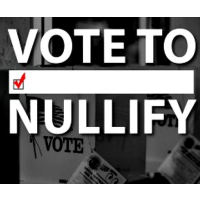Republican-Led State Governments Revive Pre-Civil War Nullification

Republican state lawmakers have reached way back into the past to offer legal justification for why their citizens don’t have to abide by “unconstitutional” federal laws governing gun control and health care.
In more than 30 states, conservatives have either introduced or adopted legislation using the 19th century principle of “nullification” to disregard Washington, DC.
“Nullification,” which was used before the Civil War, says states don’t have to listen to Congress, or the U.S. Supreme Court, on laws state governments deem unconstitutional.
In Kansas, the legislature passed a law saying federal gun regulations do not apply to firearms made and owned in Kansas. This includes the manufacture and sale of semiautomatic weapons in-state without a federal license. The law even claims the enforcement of federal gun-control statutes in Kansas would be deemed a felony.
Missouri, Alaska and Montana have also enacted similar nullification laws intended to protect gun-owners rights.
In South Carolina, a nullification bill deems President Barack Obama’s health care reform law “null and void.” It criminalizes its implementation, and allows the state attorney general “to restrain by temporary restraining order, temporary injunction, or permanent injunction” any person who is believed to be causing harm with the implementation of the Patient Protection and Affordable Care Act.
UCLA law Professor Adam Winkler told ProPublica that the nullification bills represent
“the ultimate triumph of symbolism over substance.”
Winkler says nullification laws violate the Constitution, which makes federal law “the supreme law of the land…anything in the Constitution or laws of any State to the contrary notwithstanding.” U.S. Attorney General Eric Holder, takes the same position in a letter he wrote last week to Kansas Gov. Sam Brownback, asserting that Kansas’ law is “unconstitutional.”
Winkler adds that even though the nullification trend was likely to be ineffectual, “It represents a strong, powerful opposition to our government.”
It also shows how nullification is fast becoming a mainstream option for state politicians. For example, Tennessee State Sen. Mae Beavers does not see the Supreme Court as “the ultimate arbiter of any of these laws….I don’t believe it was ever granted the authority under the Constitution,” Beavers was quoted as saying in The Tennessean. Beavers went so far as calling the Supreme Court a “dictatorship,” during a hearing about a nullification bill she had introduced.
However, the latest set of bills, such as Kansas’ new law, represent a much more aggressive challenge to federal law that is making even conservative organizations, who have supported nullification laws in the past, skeptical of the trend.
“A state law that criminalizes federal activity—I would oppose that as both imprudent and wrong,” said Trevor Burrus, a research fellow at the Cato Institute’s Center for Constitutional Studies.
Nick Dranias, a constitutional expert from the Goldwater Institute, said the term “nullification” is sometimes applied to legitimate attempts to exert state sovereignty, “and sometimes it is essentially lawless civil disobedience.”
-Aaron Wallechinsky, Noel Brinkerhoff
To Learn More:
Nullification: How States Are Making It a Felony to Enforce Federal Gun Laws (by Lois Beckett, ProPublica)
Obamacare Outlawed by South Carolina House (by Dan McCue, Courthouse News)
Nullification (U.S. Constitution) (Wikipedia)
South Carolina House Passes Nullification Bill to Make Obamacare a Crime (by David Edwards, Raw Story)
Missouri Gun Control Nullification Bill Passes (by Carl Wicklander, IVN)
- Top Stories
- Unusual News
- Where is the Money Going?
- Controversies
- U.S. and the World
- Appointments and Resignations
- Latest News
- Trump Renames National Football League National Trump League
- Trump to Stop Deportations If…
- Trump Denounces World Series
- What If China Invaded the United States?
- Donald Trump Has a Mental Health Problem and It Has a Name






Comments